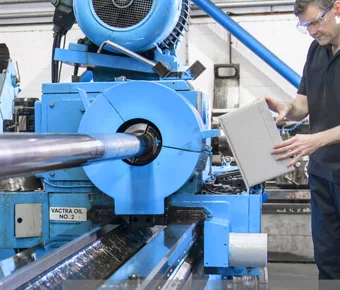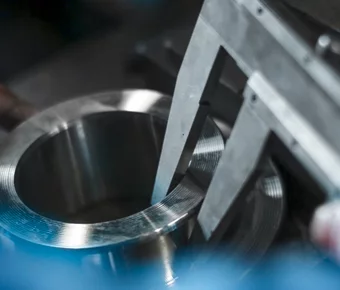1.4878 Stainless Steel – Titanium-Stabilised Stainless Steel for High-Temperature Applications
1.4878, also known as AISI 321H or X8CrNiTi18-10, is an austenitic, heat-resistant stainless steel that is titanium-stabilised to improve its resistance to intergranular corrosion. This titanium addition makes it an ideal choice for industrial components exposed to elevated temperatures. Closely related to material 1.4541, 1.4878 material is often dual-certified and widely used in pressure equipment, piping, and exhaust systems.
Physical Properties at 20 °C
- Density: 7.9 kg/dm³
- Electrical Resistivity: 0.73 Ω·mm²/m
- Thermal Conductivity: 15 W/m·K
- Specific Heat Capacity: 500 J/kg·K
- Magnetism: Low (slightly magnetic)
Typical Applications of 1.4878 Material
Thanks to its thermal stability and resistance to intergranular corrosion, 1.4878 material is widely used in:- Equipment and pressure vessel construction
- Automotive and building industry
- Chemical and petrochemical sectors
- Nuclear technology
- Pulp and paper industry
- Food processing industry
Chemical Composition of 1.4878 (AISI 321H)
| Chromium (Cr): | 17.0 – 19.0 % |
| Nickel (Ni): | 9.0 – 12.0 % |
| Titanium (Ti): | 5×C – 0.8 % |
| Carbon (C): | 0.04 – 0.10 % |
| Manganese (Mn): | min. 0 % – max. 2.00 % |
| Silicon (Si): | min. 0 % – max. 1.00 % |
| Phosphorus (P): | min. 0 % – max. 0.045 % |
| Sulfur (S): | min. 0 % – max. 0.015 % |
Mechanical Properties at 20 °C
| Hardness (HB) | ≤ 215 |
| Yield strength Rp 0.2 | ≥ 190 N/mm2 |
| Tensile strength Rm | 550 – 700 N/mm2 |
| Elongation A5, 65 | ≥ 40 % |
| Modulus of Elasticity | approx. 200 kN/mm² |
Why Is Titanium Added to 1.4878 Stainless Steel?
Titanium binds carbon in the form of titanium carbides, preventing the formation of chromium carbides. This stabilisation ensures the chromium content remains intact at the grain boundaries, making stainless steel 1.4878 highly resistant to intergranular corrosion—even after welding or thermal exposure.
Scaling Resistance of 1.4878 Material
1.4878 material is resistant to scaling in air atmospheres up to 850 °C. It performs well in oxidising environments but is not suitable for use under carburising or sulfur-rich conditions.
Creep Strength at Elevated Temperatures
As a so-called “H-grade” (321H), stainless steel 1.4878 is designed to offer enhanced creep strength for long-term use under high temperatures. This makes it particularly suitable for heat exchangers, pressure vessels, and high-temperature piping systems.
Resistance to Intergranular Corrosion
Whether in solution-annealed or welded condition, 1.4878 exhibits excellent resistance to intergranular corrosion. This makes it a dependable material for welded structures subjected to both thermal and pressure loads.
Is 1.4878 Seawater-Resistant?
No, 1.4878 stainless steel is not resistant to seawater. In chloride-rich environments, it is susceptible to pitting and crevice corrosion. For such applications, molybdenum-alloyed grades such as 1.4404 are recommended.
Behaviour in Acidic Environments
In natural environments with low chloride and salt content, 1.4878 demonstrates good general corrosion resistance. However, in highly acidic or chloride-laden media, it is only conditionally resistant.
Weldability and Processing Notes
Does Welding Require Special Precautions (e.g. hot cracking)?
1.4878 can be welded using all conventional processes, with or without filler metals. No post-weld heat treatment is required. Its titanium content significantly reduces the risk of hot cracking, further enhancing its weldability.
Both are titanium-stabilised austenitic stainless steels. However, 1.4878 has a higher carbon content than 1.4541, which enhances its creep strength. Therefore, 1.4878 stainless steel is preferred for high-temperature applications, while 1.4541 is more common in low-temperature environments.
- EN 10216-5
- EN 10297-2
- ASME SA312
The information provided on this page is non-binding. It serves only as orientation.
We cannot guarantee the results in processing and application of the products.

Tables and rates

Not the right steel available?
You will find the complete program for stainless steel piping systems in various materials for the highest requirements with us.







